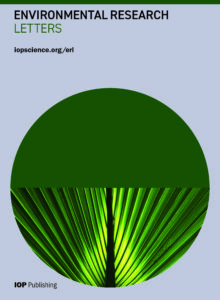ERL特刊精选|关注向低碳社会转型的需求侧解决方案

特刊详情
客座编辑
- Felix Creutzig,全球共同体与气候变化墨卡托研究所;德国柏林工业大学
- Joyashree Roy,亚洲理工学院
- Jan Minx,全球共同体与气候变化墨卡托研究所;英国利兹大学
主题范围
“Systematic review” refers to a whole suite of formal methods to aggregate evidence into discrete bodies of knowledge by reconciling evidence and understanding sources of variation in a rigorous way. Guided by the principles of reproducibility and transparency, they include formal quantitative methods for aggregating statistical and experimental research (such as meta-analysis), methods to review qualitative theory and evidence (such as meta-ethnographies), as well as methods to compile mixed quantitative and qualitative evidence (such as realist reviews). All approaches follow a clear methodological protocol involving the following steps: 1) clearly defining the research question; 2) systematically searching defined literature databases for a defined time period; 3) justifying and making transparent sources and selection of the literature; 4) systematically assessing the quality of the selected evidence; 5) justifying and making transparent methods used to synthesize the evidence based; and 6) appraising confidence in the results.
Specific questions that may be asked in the context of the specific studies include:
- What are the essential services required for a good life?
- What kind of configuration/technology/social and physical structure would enable minimal energy required to satisfy the services? Quantify this energy demand if possible, considering geographical, cultural, demographic, economic, distributional, and path dependency context where relevant
- What drives demand in different contexts? (e.g. needs, social norm, status, advertising)
- How could outcomes and policy measures be evaluated considering several normative categories:
- Utilitarian metrics, such as costs
- Hedonic metrics, such as happiness
- Capabilities (Nussbaum’s 10 core capabilities)
- Relational values connecting individuals with society and environmental qualities
- Identify no-regret options
- What are overall system configurations (technology, culture, organization, etc.) in the specific context studied, and which conditions would be enabling to transition this configuration to another low-carbon configuration with decent living standards?
- List barriers to the adoption of the most energy-efficient or lowest-carbon mode/technology, e.g. costs, status, culture, competing norms, social norms, habits, etc
- What are suitable sequences of measures to overcome these barriers?
This is the sister focus issue to the ERL focus on Evidence Synthesis for Climate Solutions. Systematic reviews may be listed within both focus issues simultaneously.
特刊文章
Editorial
Demand-side climate change mitigation: where do we stand and where do we go?
Felix Creutzig et al 2024 Environ. Res. Lett. 19 040201
Topical Reviews
Effectiveness of behavioural interventions to reduce household energy demand: a scoping review
Jordana W Composto and Elke U Weber 2022 Environ. Res. Lett. 17 063005
Status consciousness in energy consumption: a systematic review
Anjali Ramakrishnan and Felix Creutzig 2021 Environ. Res. Lett. 16 053010
Joyashree Roy et al 2021 Environ. Res. Lett. 16 043003
When adaptation increases energy demand: A systematic map of the literature
V Viguié et al 2021 Environ. Res. Lett. 16 033004
Felix Creutzig et al 2021 Environ. Res. Lett. 16 033001
Miklós Antal et al 2021 Environ. Res. Lett. 16 013002
Stephanie Jarmul et al 2020 Environ. Res. Lett. 15 123014
Nikravech Mariam et al 2020 Environ. Res. Lett. 15 123008
Stephanie Johnson Zawadzki et al 2020 Environ. Res. Lett. 15 123007
Leah Temper et al 2020 Environ. Res. Lett. 15 123004
Jasmin Cantzler et al 2020 Environ. Res. Lett. 15 123001
A map of roadmaps for zero and low energy and carbon buildings worldwide
É Mata et al 2020 Environ. Res. Lett. 15 113003
Determinants of low-carbon transport mode adoption: systematic review of reviews
Aneeque Javaid et al 2020 Environ. Res. Lett. 15 103002
Climate change mitigation in cities: a systematic scoping of case studies
Mahendra Sethi et al 2020 Environ. Res. Lett. 15 093008
A systematic review of the energy and climate impacts of teleworking
Andrew Hook et al 2020 Environ. Res. Lett. 15 093003
Quantifying the potential for climate change mitigation of consumption options
Diana Ivanova et al 2020 Environ. Res. Lett. 15 093001
Dominik Wiedenhofer et al 2020 Environ. Res. Lett. 15 063002
Victor Court and Steven Sorrell 2020 Environ. Res. Lett. 15 043001
Edgar G Hertwich et al 2019 Environ. Res. Lett. 14 043004
Letters
É Mata et al 2021 Environ. Res. Lett. 16 055011
Lifestyle changes in mitigation pathways: policy and scientific insights
Mathieu Saujot et al 2021 Environ. Res. Lett. 16 015005
Helmut Haberl et al 2020 Environ. Res. Lett. 15 065003
期刊介绍

- 2023年影响因子:5.8 Citescore: 11.9
- Environmental Research Letters(ERL)以金色开放获取模式出版,作者可选择将原始数据作为补充资料与文章一起发表。所有研究人员可以免费获取这些研究成果。ERL汇聚了关注环境变化及其应对的研究团体和政策制定团体的意见,涵盖了环境科学的所有方面,出版研究快报、综述文章、观点和社论。ERL顺应了环境科学的跨学科发表的趋势,反映了该领域相关的方法、工具和评估战略,得到了来自不同领域的广泛贡献。
